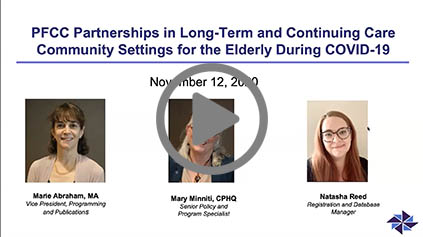IPFCC recognizes the enormous and tragic impact that COVID-19 is having on the health care system across the world. We remain firmly committed to advancing patient- and family-centered approaches that also adhere to the safest guidelines and pose the least burden on health care professionals.

In direct care, maintaining connections between patients and their families is vital to health and healing. Yet, to prevent the spread of the virus, health care facilities have understandably restricted the physical presence of families and others. The words used and the tone of communications related to COVID-19 are important to conveying the essential role of families and care partners. Many organizations are creatively establishing ways to connect patients, their families, and care partners and continue to support the concept that families are key partners for safety.
Additionally, it's important that organizations "re-visit" restrictions on family presence to achieve a better balance between benefits and harms for patients, families, clinicians, and communities.
Partnerships with patient and family advisors are also affected by COVID-19. Advisory council meetings, workgroups, committees, and other collaborative activities are no longer being held onsite but that should not mean that the work could not continue. There are multiple, valuable roles for patient and family advisors/partners, particularly at this time. Unlike the pandemics in previous decades, technology provides numerous ways to collaborate.
Webinars — Patient- and Family-Centered Strategies During COVID-19
IPFCC hosts webinars to provide insights and best practices for advancing PFCC during the pandemic. Webinars are funded by the New York State Health Foundation and the Lucile Packard Foundation for Children’s Health. Recordings of all webinars and resources are available for free.
Access them here.

